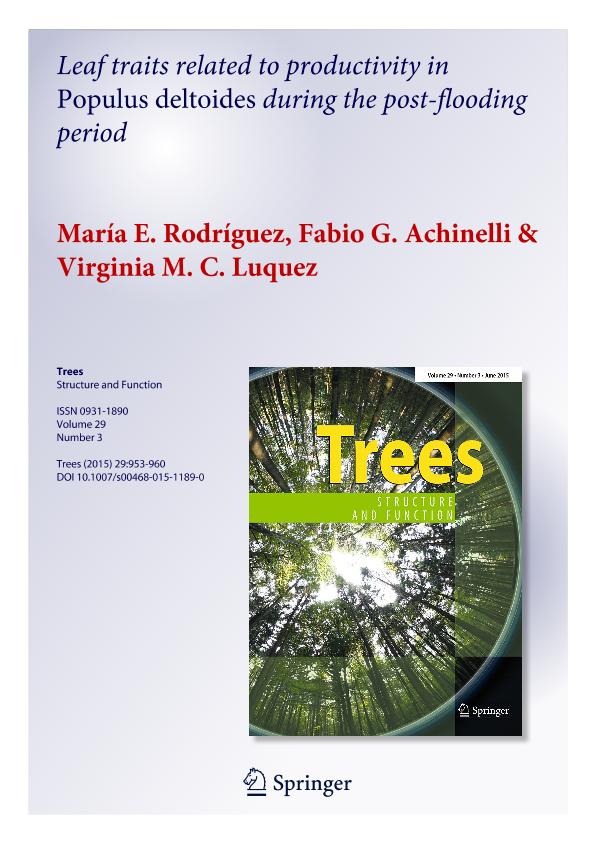Mostrar el registro sencillo del ítem
dc.contributor.author
Rodríguez, María Emilia

dc.contributor.author
Achinelli, Fabio Germán

dc.contributor.author
Luquez, Virginia Martha Cristina

dc.date.available
2018-07-30T14:59:56Z
dc.date.issued
2015-06
dc.identifier.citation
Rodríguez, María Emilia; Achinelli, Fabio Germán; Luquez, Virginia Martha Cristina; Leaf traits related to productivity in Populus deltoides during the post-flooding period; Springer; Trees; 29; 3; 6-2015; 953-960
dc.identifier.issn
0931-1890
dc.identifier.uri
http://hdl.handle.net/11336/53385
dc.description.abstract
Key message: After a flooding period,Populus deltoidesplants compensate for the reduced growth under flooding by substituting the leaf area loss instead of increasing the leaf photosynthetic activity. Abstract: Flooding stress induces changes in trees at plant and leaf level that can reduce growth and productivity. In this work, we explored changes in leaf traits related to productivity during the post-flooding period in three poplar clones with different degrees of flooding sensibility. Our hypothesis was that changes in leaf traits could lead to a higher photosynthetic activity in the post-flooding period to compensate for the reduction in carbon fixation under flooding. Plants were grown in pots in a greenhouse. Flooding was induced by filling the pots with tap water up to 5 cm over the surface soil for 28 days. After this period, flooding ended and plant recovery was followed for 44 days. Flooding decreased total leaf area, stomatal conductance and photosynthetic rate, but leaf size, stomatal, leaf area, chlorophyll and Rubisco content were not affected. Stomatal index was reduced in one clone and leaf thickness was increased in another one. During the post-flooding period, the formerly flooded plants of all clones produced leaves with increased area and thickness compared to the control plants, but specific leaf area and chlorophyll and Rubisco content were not altered. Stomatal index was only decreased in one clone. The leaves expanded in the post-flooding period did not increase their photosynthetic capacity, but had a higher water use efficiency and a lower stomatal conductance. The plants compensated for the reduced growth under flooding by substituting the leaf area loss instead of increasing the photosynthetic activity.
dc.format
application/pdf
dc.language.iso
eng
dc.publisher
Springer

dc.rights
info:eu-repo/semantics/openAccess
dc.rights.uri
https://creativecommons.org/licenses/by-nc-sa/2.5/ar/
dc.subject
Flooding
dc.subject
Leaf Traits
dc.subject
Photosynthesis
dc.subject
Populus Deltoides
dc.subject.classification
Agricultura

dc.subject.classification
Agricultura, Silvicultura y Pesca

dc.subject.classification
CIENCIAS AGRÍCOLAS

dc.title
Leaf traits related to productivity in Populus deltoides during the post-flooding period
dc.type
info:eu-repo/semantics/article
dc.type
info:ar-repo/semantics/artículo
dc.type
info:eu-repo/semantics/publishedVersion
dc.date.updated
2018-07-30T13:38:05Z
dc.journal.volume
29
dc.journal.number
3
dc.journal.pagination
953-960
dc.journal.pais
Alemania

dc.journal.ciudad
Berlin
dc.description.fil
Fil: Rodríguez, María Emilia. Consejo Nacional de Investigaciones Científicas y Técnicas. Centro Científico Tecnológico Conicet - La Plata. Instituto de Fisiología Vegetal. Universidad Nacional de La Plata. Facultad de Ciencias Naturales y Museo. Instituto de Fisiología Vegetal; Argentina
dc.description.fil
Fil: Achinelli, Fabio Germán. Consejo Nacional de Investigaciones Científicas y Técnicas. Centro Científico Tecnológico Conicet - La Plata. Instituto de Fisiología Vegetal. Universidad Nacional de La Plata. Facultad de Ciencias Naturales y Museo. Instituto de Fisiología Vegetal; Argentina. Provincia de Buenos Aires. Gobernación. Comisión de Investigaciones Científicas; Argentina
dc.description.fil
Fil: Luquez, Virginia Martha Cristina. Consejo Nacional de Investigaciones Científicas y Técnicas. Centro Científico Tecnológico Conicet - La Plata. Instituto de Fisiología Vegetal. Universidad Nacional de La Plata. Facultad de Ciencias Naturales y Museo. Instituto de Fisiología Vegetal; Argentina
dc.journal.title
Trees

dc.relation.alternativeid
info:eu-repo/semantics/altIdentifier/doi/https://dx.doi.org/10.1007/s00468-015-1189-0
dc.relation.alternativeid
info:eu-repo/semantics/altIdentifier/url/https://link.springer.com/article/10.1007%2Fs00468-015-1189-0
Archivos asociados
